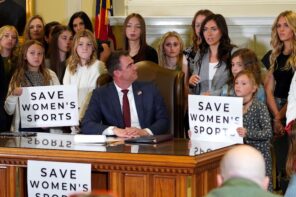While a new survey released this week by the PRRI confirms a great deal of what we already know about religion in the 2012 presidential race, it does provide some striking new data about perceptions of Mormonism among younger voters.
Here are the familiar findings:
- About 40% of Americans are at least somewhat uncomfortable with the idea of a Mormon president.
- More Democrats (50%) report discomfort with an LDS president than Republicans (36%) or Independents (38%).
- About half of white evangelicals say we’re not Christian.
- Two-thirds of American voters perceive Mormon beliefs as being significantly different than their own. Voters who perceive Mormonism as “different” are significantly less likely to favor Romney.
- And only 40% know Mitt Romney is Mormon. For now.
And here is some startling new data: younger voters—the so-called “millenials” aged 18-29—view Mormonism far less favorably than their elders.
Fifty-six percent of voters aged 18-29 said they were at least somewhat uncomfortable with the idea of a Mormon president, while only 39% of older voters reported discomfort. This figure is especially striking given that when asked about the prospect of a Muslim president, younger voters were far less likely to report discomfort (50%) than older voters (74%).
I spoke to PRRI Director of Research Dan Cox, an expert in youth politics and religion, to get a sense of what might be motivating discomfort with Mormon candidates among millennial voters. According to Cox, millennials are significantly more diverse than older voter cohorts: four in ten millennials are African-American, Latino, or Asian-American. Thanks in part to social media, they also interact with an incredibly diverse range of peers. “They have friends who are immigrants or are from immigrant families. They have friends who are LGBT. This impacts the way they view issues like immigration and LGBT rights,” according to Cox. “They believe that LGBT people are ‘just like me.’”
Millenials are also less likely than older voters to report a religious affiliation: fully one-third report no affiliation at all. “They see the social conservatism of some churches, and they say, ‘if this is what religion looks like, I want no part of it,’” says Cox.
Cox believes that millennial voter aversion to Mormon candidates (evangelicals too scored low marks among 18-29 year olds) may be in reaction to the perceived social conservatism of Mormonism, and particularly its political campaigns against same-sex marriage.
If Cox is right—and it would be great to see subsequent polls gathering qualitative data to confirm these hypotheses—It’s not that millennials hold a prejudicial view of Mormonism as a cult, or discredit our theology. It’s that they object to the Church’s stance on LGBT civil equality.
And that’s an image problem even the much celebrated “I’m a Mormon” ad by Killers frontman Brandon Flowers may not be able to fix.




